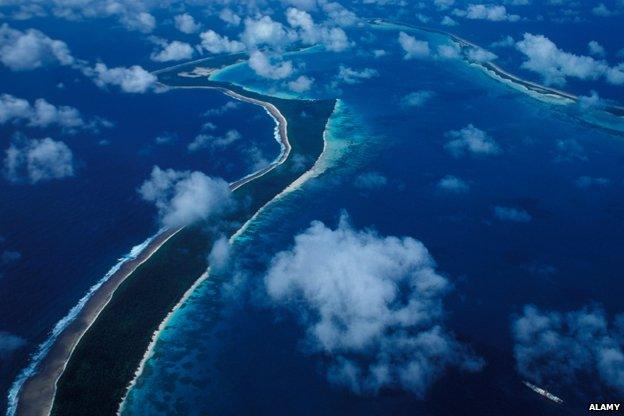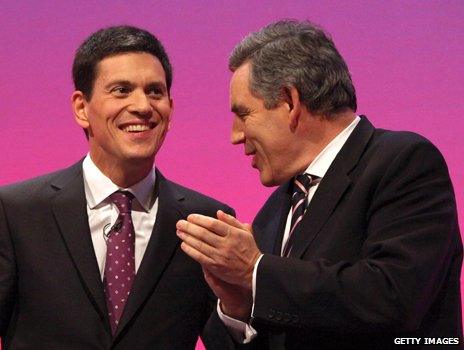Did David Miliband ignore Gordon Brown on Chagos?
- Published
- comments

An aerial photo of Diego Garcia
The prime minister of Mauritius claims the Foreign Office ignored the wishes of the then prime minister Gordon Brown in relation to the future of the strategically important Chagos Islands and Diego Garcia in the Indian Ocean.
This tale is, I suppose, not a natural for an economics editor (though it certainly has economic elements). It is a resonant story of an indigenous people displaced by British foreign policy in the 1960s, today's defence alliance between the UK and US, and seeming tension between Downing Street and the Foreign and Commonwealth Office (FCO) in the last Labour government.
The case has included the disclosure of a memo written by a government official in 1966 describing the inhabitants of the Chagos islands in the Indian Ocean, who would be forcibly removed by the British, as "some few Tarzans or Man Fridays, whose origins are obscure".
The nub of the dispute is about the imposition of a ban on fishing and other commercial activities by the British around these islands, which are claimed as British property and which - according to Mauritius - makes it much harder for the expelled indigenous people ever to return to their homes.
The plaintiff in the case, Mauritius, claims that the FCO and the foreign secretary in the last Labour government, David Miliband, ignored a promise not to unilaterally impose a so-called marine protection area (MPA) around the strategically important Chagos archipelago made by the previous prime minister, Gordon Brown.
A witness statement filed at the United Nation's Permanent Court of Arbitration in Mauritius v UK, by the prime minister of Mauritius, Navinchandra Ramgaloom, details how on 27 November 2009 he had a conversation with Mr Brown in the margins of the Commonwealth Heads of Government Conference in Port of Spain, Trinidad and Tobago.

David Miliband and Gordon Brown in 2009
Mr Ramgaloom expressed his concerns about the UK's intention to establish the MPA around Chagos, which would have prohibited all fishing in an area of a quarter of a million square miles around the islands.
This would have damaged Mauritius's fishing industry. But more seriously for Mr Ramgaloom, it would have undermined attempts to resettle 2,000 indigenous Chagossians who were forcibly removed by the UK from the islands in the late 1960s and early 1970s.
This ulterior motive for the MPA was apparently corroborated by a Foreign Office cable of May 2009, disclosed by Wikileaks in December 2010, which reported an FCO official Colin Roberts as saying that "a marine park would, in effect, put paid to the resettlement claims of the Archipelago's former residents".
Mr Ramgaloom says in his witness statement that he conveyed to Mr Brown his view that the MPA should be discussed in bilateral talks between Mauritius and the UK on the future of the Chagos islands and should not be imposed unilaterally.
The Mauritian prime minister reports Mr Brown as saying, "I will put it [the MPA] on hold".
Mr Ramgaloom says Mr Brown "told me that he would speak to the British foreign secretary and that "he also assured me that the Marine Protection Area would be discussed only within the framework of bilateral talks between Mauritius and the UK".
However, just four months later, on 1 April 2010, David Miliband announced the UK would be creating the MPA. An FCO press release of that date quotes him as saying he was doing this because it represented a "major step forward for protecting the oceans [in an ecological sense]".
In the press release announcing the MPA, Mr Miliband made explicit that the UK was only holding on to the Chagos islands because it was "needed for defence purposes".
The point is that one of the Chagos islands, Diego Garcia, contains a substantial US military base, leased to the Americans by the UK.
The Wikileaks FCO cable underlines the strategic importance of this military base by saying that "the UK and US should carefully negotiate the details of the marine reserve to assure that US interests were safeguarded".
The case is regarded as of such significance by the FCO that it is being represented at the hearing, taking place in Istanbul in Turkey, by the Attorney General, Dominic Grieve.
The UK imposed the MPA on 1 November 2010.
The UK defence team in the case says that "when the allegation first arose in late December 2009 that the United Kingdom prime minister had given any such undertaking to withdraw the public consultation [and decide the future of Chagos only in bilateral talks with Mauritius], the prime minister was asked whether he had: he said he had not."
On 20 December 2010, the Mauritian Government launched a case at the Permanent Court of Arbitration, claiming that the UK had acted illegally under the 1982 UN Convention on the Law of the Sea.
Mauritius claims sovereignty over the islands, which were part of the country until separated by the UK in 1965 - when it combined them with three islands taken from the Seychelles to form the British Indian Ocean Territory.
Memos written in 1966 by British officials about the separation from Mauritius of the Chagos islands have an almost flippant tone. One says: "We must surely be very tough about this. The object of the exercise was to get some rocks which will remain ours; there will be no indigenous population except seagulls who have not yet a Committee (the Status of Women Committee does not cover the rights of birds)."